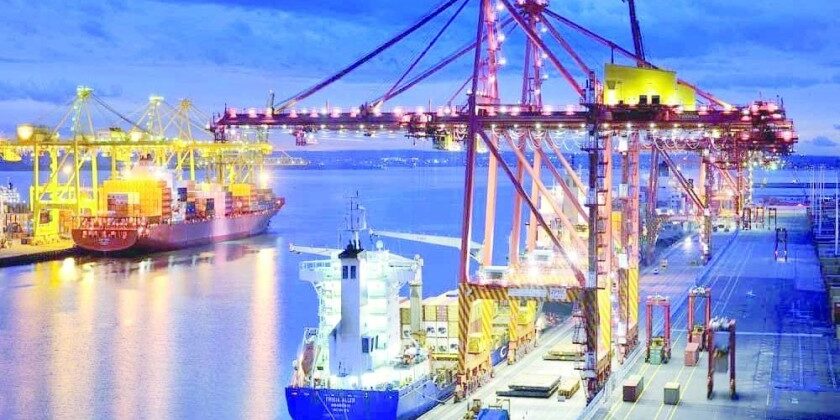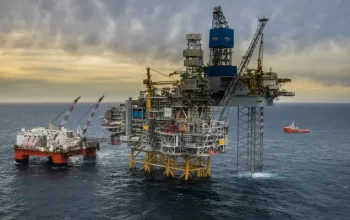The Minister of State for Economic Coordination, José de Lima Massano, expressed on Wednesday in Luanda the government’s commitment to provide all necessary support for the continuation of economic diversification efforts, with the participation of oil companies.
José de Lima Massano, who was speaking at the opening of the 4th Annual Oil and Gas Sector Conference and Exhibition, stated that the government would not cease to make the necessary investments in natural resources, including petroleum resources, to ensure their exploration.
The Minister of State for Economic Coordination, José de Lima Massano, highlighted the importance that the petroleum sector has been playing in the growth and development of the national economy.
José Massano, speaking to the press on the sidelines of the 4th Annual Oil and Gas Sector Conference and Exhibition 2023, which is held under the theme “Energy Security, Decarbonization, and Sustainability,” pointed out that the petroleum sector continues to grow and has the capacity to keep up with the population growth rate.
According to the minister, the petroleum sector represents 30 percent of Angola’s Gross Domestic Product (GDP) and 95 percent of exports. “With the ongoing economic diversification program, the petroleum sector has played a significant role. We are aware of the challenges facing this sector,” he said.
José Massano stated that despite the crucial role of the petroleum sector in the country’s economic growth, the government will continue to invest in non-petroleum sectors to serve as a driving force for social inclusion in Angola.
The Minister of State indicated that the non-petroleum sector in Angola will continue to grow, even though the current economic situation in the country is challenging.
Massano mentioned that the government is implementing a set of measures to stimulate the country’s economy, and it is expected that this year will see positive steps in economic growth.
“We are placing a strong emphasis on the non-petroleum sector to achieve high economic growth, capable of meeting the primary needs of the population, particularly food security. The government is committed to providing better conditions for its citizens in this sector,” he said.
José Massano emphasized that the government’s focus will continue to be on the non-petroleum sector, despite the favorable dynamics of the petroleum sector in the economy.
Price Stability The Minister of State for Economic Coordination stated that the government continues to face pressure on prices in the domestic market due to a limited supply of goods, international market price issues, and import difficulties caused by a high exchange rate in March and April of this year.
José Massano mentioned that the country is still dealing with exchange rate and fuel price correction issues.
“We are not in a situation of uncontrolled price increases at this level; therefore, the parameters continue to be reasonable, and we hope that prices will become more moderate in the coming months,” he pointed out.
For this year, he stated that the government does not plan to issue Eurobonds to finance the country’s economy.
“The government is not considering the issuance of Eurobonds to finance the economy. We are working to organize our public finances so that we can sustain the General State Budget with the resources we have available. Eurobonds may be considered for the following fiscal year,” he said.
ANPG Signs Technical Support Partnership Agreements
The National Oil, Gas, and Biofuels Agency (ANPG) signed three technical and scientific cooperation agreements with Agostinho Neto University (UAN), Catholic University of Angola (UCAN), and the Polytechnic Institute of Technologies and Sciences (ISPTEC) during the 4th Annual Oil and Gas Sector Conference and Exhibition 2023.
The signed agreements aim to establish a cooperation program to provide technical support to ANPG in the development and production of energy resources (oil, gas, and renewable energies, including biofuels), scientific research, and human capital development through a program of bachelor’s, master’s, and doctoral degrees.
The agreements also involve identifying and creating the necessary conditions for conducting studies and research on topics defined by the parties, developing and implementing the training plan, disseminating knowledge obtained through experiments under this protocol, and promoting scientific research, the results of which should be published in accordance with specific requirements set by scientific journals.
Paulino Jerónimo, Chairman of the Board of Directors of ANPG, who signed the agreements, emphasized that the petroleum sector relies on continuous research processes and specialized training.
Open Door
For João Fernando Manuel, President of the Polytechnic Institute of Technologies and Sciences (ISPTEC), the agreement signed with ANPG represents an opportunity for the institution, focusing on education in engineering and technology.
Azule Energy, an oil company, also signed a partnership agreement with Sonangol, aimed at the decarbonization of oil and gas in Angola, as part of the initiative to reduce greenhouse gases.
Adriano Mongini, President of Azule Energy, stated that the agreement with Sonangol serves to extend partnerships between the two oil companies in the field of decarbonization of oil.
“Our partnership is longstanding, so both companies see opportunities to expand the partnership into other initiatives, such as solar, wind, and blue hydrogen energy,” he said. Currently, Azule Energy produces an average of 220,000 barrels of oil per day.
Conference
On the first day of the conference, topics related to “Decarbonization of Oil and Gas in Angola,” “Promoting Diversity, Inclusion, and Orientation in the Oil and Gas Sector,” and “Mobilizing Capital for Angola’s Infrastructure” were discussed.
The event, which concludes today, features the participation of more than 100 companies operating in the petroleum sector from 40 countries, aiming to promote business, partnerships, discoveries, and capitalize on new trade and investment opportunities in Angola.
Angola Embraces Energy Transition
The Minister of Mineral Resources, Petroleum, and Gas, Diamantino Azevedo, stated that the 4th Annual Oil and Gas Sector Conference and Exhibition 2023 is taking place in the context of an energy transition, which requires clear decisions to ensure energy security and address future challenges.
Diamantino Azevedo emphasized that in Angola, energy security and decarbonization are being pursued as part of the energy matrix diversification.
He added that, in addition to increased investments in hydropower projects, the government has been taking various actions related to the photovoltaic segment and has been promoting the conversion of atomic diesel energy production units to gas.
He noted that the Master Plan for Natural Gas, currently in the consultation phase with sector partners, will constitute the strategy for the development of this resource, which could contribute to economic diversification through the creation of petrochemical and steel industries, primarily as investment opportunities for the private sector.
The minister explained that for energy security to become a reality, the continent must have the capacity to mobilize the necessary investments for the exploitation of its various energy sources and develop the required infrastructure.
Diamantino Azevedo assured that the country offers several investment opportunities in the petroleum industry.
He highlighted Angola’s efforts to achieve self-sufficiency in petroleum derivatives by constructing three new refineries in Cabinda, Soyo, and Lobito.
He also mentioned the construction of onshore storage facilities, such as the Barra do Dande ocean terminal, whose first phase is expected to be completed in 2024, with a capacity to store 582,000 cubic meters of diesel, gasoline, and LPG, which should contribute to the expansion of fuel supply.
Africa May Hold 120 Billion Barrels of Oil
Haitham Al-Ghais, Secretary-General of the Organization of the Petroleum Exporting Countries (OPEC), stated in Luanda that the African continent has approximately 120 billion barrels of crude oil reserves.
During his remarks at the 4th Annual Oil and Gas Sector Conference and Exhibition 2023, Haitham Al-Ghais also mentioned that the continent possesses abundant natural gas reserves estimated at 18 trillion cubic meters.
According to projections, the global population may increase by approximately 1.6 billion by 2045, and the global economy is expected to double during the same timeframe.
As a result of this demographic and economic shift, global primary energy demand is forecasted to increase by more than 23 percent by 2045, necessitating a daily demand for oil of about 110 million barrels by 2045.
To meet the future demand needs, the global petroleum sector will require an investment of around $12.1 trillion.
Haitham Al-Ghais added that the continent has considerable renewable energy sources, including hydropower, wind, solar, and biomass.
With these resources, the African continent could contribute to reducing extreme energy poverty, as approximately 600 million people in Africa currently lack access to any source of energy.
![]()




